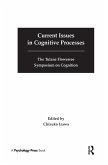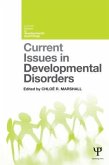Current Issues in Work and Organizational Psychology
Herausgeber: Cooper, Cary
Current Issues in Work and Organizational Psychology
Herausgeber: Cooper, Cary
- Gebundenes Buch
- Merkliste
- Auf die Merkliste
- Bewerten Bewerten
- Teilen
- Produkt teilen
- Produkterinnerung
- Produkterinnerung
This comprehensive new collection provides an essential overview of the hottest topics in work and organizational psychology. Including 24 chapters by many of the leading researchers in the field, the book is split into two parts; the individual in the workplace and how individuals are organized at work.
Andere Kunden interessierten sich auch für
![Current Issues in Memory Current Issues in Memory]() Current Issues in Memory195,99 €
Current Issues in Memory195,99 €![Current Directions in Ostracism, Social Exclusion and Rejection Research Current Directions in Ostracism, Social Exclusion and Rejection Research]() Current Directions in Ostracism, Social Exclusion and Rejection Research168,99 €
Current Directions in Ostracism, Social Exclusion and Rejection Research168,99 €![Current Issues in Applied Memory Research Current Issues in Applied Memory Research]() Current Issues in Applied Memory Research171,99 €
Current Issues in Applied Memory Research171,99 €![Current Issues in Cognitive Processes Current Issues in Cognitive Processes]() Current Issues in Cognitive Processes111,99 €
Current Issues in Cognitive Processes111,99 €![Current Issues Facing Men and Boys Current Issues Facing Men and Boys]() Benjamin A. HineCurrent Issues Facing Men and Boys171,99 €
Benjamin A. HineCurrent Issues Facing Men and Boys171,99 €![Current Topics in Animal Learning Current Topics in Animal Learning]() Current Topics in Animal Learning169,99 €
Current Topics in Animal Learning169,99 €![Current Issues in Developmental Disorders Current Issues in Developmental Disorders]() Current Issues in Developmental Disorders178,99 €
Current Issues in Developmental Disorders178,99 €-
-
-
This comprehensive new collection provides an essential overview of the hottest topics in work and organizational psychology. Including 24 chapters by many of the leading researchers in the field, the book is split into two parts; the individual in the workplace and how individuals are organized at work.
Produktdetails
- Produktdetails
- Verlag: Routledge
- Seitenzahl: 440
- Erscheinungstermin: 11. September 2018
- Englisch
- Abmessung: 260mm x 208mm x 28mm
- Gewicht: 1160g
- ISBN-13: 9781138604940
- ISBN-10: 1138604941
- Artikelnr.: 54062042
- Herstellerkennzeichnung
- Libri GmbH
- Europaallee 1
- 36244 Bad Hersfeld
- gpsr@libri.de
- Verlag: Routledge
- Seitenzahl: 440
- Erscheinungstermin: 11. September 2018
- Englisch
- Abmessung: 260mm x 208mm x 28mm
- Gewicht: 1160g
- ISBN-13: 9781138604940
- ISBN-10: 1138604941
- Artikelnr.: 54062042
- Herstellerkennzeichnung
- Libri GmbH
- Europaallee 1
- 36244 Bad Hersfeld
- gpsr@libri.de
Professor Sir Cary Cooper, CBE, is the 50th Anniversary Professor of Organizational Psychology and Health at the Alliance Manchester Business School, University of Manchester, President of the CIPD, President of the British Academy of Management, former President of Relate, and President of the Institute of Welfare. He is a Companion of the Chartered Management Institute and one of only a few UK Fellows of the (American) Academy of Management.
Introduction: Cary Cooper
Section 1: The Individual at Work
1. The episodic structure of life at work, Beal and Weiss (A Day in the
Life of the Happy Worker)
2. Personality testing in personnel selection, Diekmann & Konig (
Employee Recruitment, Selection, and Assessment)
3. Interventions to prevent and alleviate burnout, Leiter & Maslach (
Burnout at Work)
4. Humor, Stress, and Coping, Booth-Butterfield & Wanzer (The Psychology
of Humor)
5. Email overload, Rennecker & Derks (The Psychology of Digital Media at
Work)
6. Time, performance, and motivation, Roe (Time and Work, Volume 1)
7. A closer look at key concepts of the work-nonwork interface,
Demerouti, Corts & Boz (New Frontiers in Work and Family Research)
8. The spillover-crossover model, Bakker & Demerouti (New Frontiers in
Work and Family Research)
9. Individualization of work arrangements, Bal & Lub (Idiosyncratic
Deals between Employees and Organizations)
10. Not so i-deal, Conway & Coyle-Shapiro (Idiosyncratic Deals between
Employees and Organizations)
11. Individual well-being and performance at work, Taris & Schaufeli (
Wellbeing and Performance at Work)
12. The active employee, Tims & Kooij (Wellbeing and Performance at Work
)
13. Individuals in the diverse workplace, Oudenhoven, Zee & Paulus (
Towards Inclusive Organizations)
Section II: The Organization of People at Work
14. Recruitment processes and organizational attraction, Chapman & Mayers
(Employee Recruitment, Selection, and Assessment)
15. Job characteristics and problem-solving, Daniels (A Day in the Life
of the Happy Worker)
16. The good and bad of working relationships, Day & Leiter (Burnout at
Work)
17. Flow at work, Fullager, Fave and Van Krevelen (Flow at Work)
18. Online social networks in the work context, Stopfer & Gosling (The
Psychology of Digital Media at Work)
19. Becoming, Ashforth, Harrison & Sluss (Time and Work, Volume 1)
20. Time and leadership, Day (Time and Work, Volume 2)
21. Using a positive organizational scholarship lens to enrich research
on work-family relationships, Spreitzer (New Frontiers in Work and
Family Research)
22. A strategic HRM perspective on i-deals, Kroon, Freese & Schalk (
Idiosyncratic Deals between Employees and Organizations)
23. Organizational perspectives on diversity, Zee & Otten (Towards
Inclusive Organizations)
24. Organizational Change, Tomprou & Hansen (The Impact of Organizational
Change)
25. Conclusions, Cary Cooper
Section 1: The Individual at Work
1. The episodic structure of life at work, Beal and Weiss (A Day in the
Life of the Happy Worker)
2. Personality testing in personnel selection, Diekmann & Konig (
Employee Recruitment, Selection, and Assessment)
3. Interventions to prevent and alleviate burnout, Leiter & Maslach (
Burnout at Work)
4. Humor, Stress, and Coping, Booth-Butterfield & Wanzer (The Psychology
of Humor)
5. Email overload, Rennecker & Derks (The Psychology of Digital Media at
Work)
6. Time, performance, and motivation, Roe (Time and Work, Volume 1)
7. A closer look at key concepts of the work-nonwork interface,
Demerouti, Corts & Boz (New Frontiers in Work and Family Research)
8. The spillover-crossover model, Bakker & Demerouti (New Frontiers in
Work and Family Research)
9. Individualization of work arrangements, Bal & Lub (Idiosyncratic
Deals between Employees and Organizations)
10. Not so i-deal, Conway & Coyle-Shapiro (Idiosyncratic Deals between
Employees and Organizations)
11. Individual well-being and performance at work, Taris & Schaufeli (
Wellbeing and Performance at Work)
12. The active employee, Tims & Kooij (Wellbeing and Performance at Work
)
13. Individuals in the diverse workplace, Oudenhoven, Zee & Paulus (
Towards Inclusive Organizations)
Section II: The Organization of People at Work
14. Recruitment processes and organizational attraction, Chapman & Mayers
(Employee Recruitment, Selection, and Assessment)
15. Job characteristics and problem-solving, Daniels (A Day in the Life
of the Happy Worker)
16. The good and bad of working relationships, Day & Leiter (Burnout at
Work)
17. Flow at work, Fullager, Fave and Van Krevelen (Flow at Work)
18. Online social networks in the work context, Stopfer & Gosling (The
Psychology of Digital Media at Work)
19. Becoming, Ashforth, Harrison & Sluss (Time and Work, Volume 1)
20. Time and leadership, Day (Time and Work, Volume 2)
21. Using a positive organizational scholarship lens to enrich research
on work-family relationships, Spreitzer (New Frontiers in Work and
Family Research)
22. A strategic HRM perspective on i-deals, Kroon, Freese & Schalk (
Idiosyncratic Deals between Employees and Organizations)
23. Organizational perspectives on diversity, Zee & Otten (Towards
Inclusive Organizations)
24. Organizational Change, Tomprou & Hansen (The Impact of Organizational
Change)
25. Conclusions, Cary Cooper
Introduction: Cary Cooper
Section 1: The Individual at Work
1. The episodic structure of life at work, Beal and Weiss (A Day in the
Life of the Happy Worker)
2. Personality testing in personnel selection, Diekmann & Konig (
Employee Recruitment, Selection, and Assessment)
3. Interventions to prevent and alleviate burnout, Leiter & Maslach (
Burnout at Work)
4. Humor, Stress, and Coping, Booth-Butterfield & Wanzer (The Psychology
of Humor)
5. Email overload, Rennecker & Derks (The Psychology of Digital Media at
Work)
6. Time, performance, and motivation, Roe (Time and Work, Volume 1)
7. A closer look at key concepts of the work-nonwork interface,
Demerouti, Corts & Boz (New Frontiers in Work and Family Research)
8. The spillover-crossover model, Bakker & Demerouti (New Frontiers in
Work and Family Research)
9. Individualization of work arrangements, Bal & Lub (Idiosyncratic
Deals between Employees and Organizations)
10. Not so i-deal, Conway & Coyle-Shapiro (Idiosyncratic Deals between
Employees and Organizations)
11. Individual well-being and performance at work, Taris & Schaufeli (
Wellbeing and Performance at Work)
12. The active employee, Tims & Kooij (Wellbeing and Performance at Work
)
13. Individuals in the diverse workplace, Oudenhoven, Zee & Paulus (
Towards Inclusive Organizations)
Section II: The Organization of People at Work
14. Recruitment processes and organizational attraction, Chapman & Mayers
(Employee Recruitment, Selection, and Assessment)
15. Job characteristics and problem-solving, Daniels (A Day in the Life
of the Happy Worker)
16. The good and bad of working relationships, Day & Leiter (Burnout at
Work)
17. Flow at work, Fullager, Fave and Van Krevelen (Flow at Work)
18. Online social networks in the work context, Stopfer & Gosling (The
Psychology of Digital Media at Work)
19. Becoming, Ashforth, Harrison & Sluss (Time and Work, Volume 1)
20. Time and leadership, Day (Time and Work, Volume 2)
21. Using a positive organizational scholarship lens to enrich research
on work-family relationships, Spreitzer (New Frontiers in Work and
Family Research)
22. A strategic HRM perspective on i-deals, Kroon, Freese & Schalk (
Idiosyncratic Deals between Employees and Organizations)
23. Organizational perspectives on diversity, Zee & Otten (Towards
Inclusive Organizations)
24. Organizational Change, Tomprou & Hansen (The Impact of Organizational
Change)
25. Conclusions, Cary Cooper
Section 1: The Individual at Work
1. The episodic structure of life at work, Beal and Weiss (A Day in the
Life of the Happy Worker)
2. Personality testing in personnel selection, Diekmann & Konig (
Employee Recruitment, Selection, and Assessment)
3. Interventions to prevent and alleviate burnout, Leiter & Maslach (
Burnout at Work)
4. Humor, Stress, and Coping, Booth-Butterfield & Wanzer (The Psychology
of Humor)
5. Email overload, Rennecker & Derks (The Psychology of Digital Media at
Work)
6. Time, performance, and motivation, Roe (Time and Work, Volume 1)
7. A closer look at key concepts of the work-nonwork interface,
Demerouti, Corts & Boz (New Frontiers in Work and Family Research)
8. The spillover-crossover model, Bakker & Demerouti (New Frontiers in
Work and Family Research)
9. Individualization of work arrangements, Bal & Lub (Idiosyncratic
Deals between Employees and Organizations)
10. Not so i-deal, Conway & Coyle-Shapiro (Idiosyncratic Deals between
Employees and Organizations)
11. Individual well-being and performance at work, Taris & Schaufeli (
Wellbeing and Performance at Work)
12. The active employee, Tims & Kooij (Wellbeing and Performance at Work
)
13. Individuals in the diverse workplace, Oudenhoven, Zee & Paulus (
Towards Inclusive Organizations)
Section II: The Organization of People at Work
14. Recruitment processes and organizational attraction, Chapman & Mayers
(Employee Recruitment, Selection, and Assessment)
15. Job characteristics and problem-solving, Daniels (A Day in the Life
of the Happy Worker)
16. The good and bad of working relationships, Day & Leiter (Burnout at
Work)
17. Flow at work, Fullager, Fave and Van Krevelen (Flow at Work)
18. Online social networks in the work context, Stopfer & Gosling (The
Psychology of Digital Media at Work)
19. Becoming, Ashforth, Harrison & Sluss (Time and Work, Volume 1)
20. Time and leadership, Day (Time and Work, Volume 2)
21. Using a positive organizational scholarship lens to enrich research
on work-family relationships, Spreitzer (New Frontiers in Work and
Family Research)
22. A strategic HRM perspective on i-deals, Kroon, Freese & Schalk (
Idiosyncratic Deals between Employees and Organizations)
23. Organizational perspectives on diversity, Zee & Otten (Towards
Inclusive Organizations)
24. Organizational Change, Tomprou & Hansen (The Impact of Organizational
Change)
25. Conclusions, Cary Cooper









